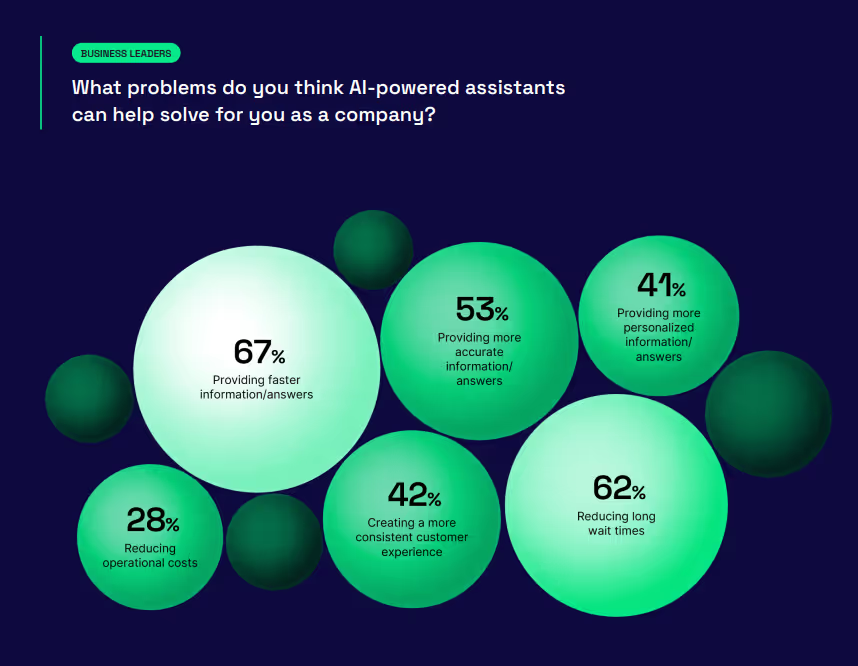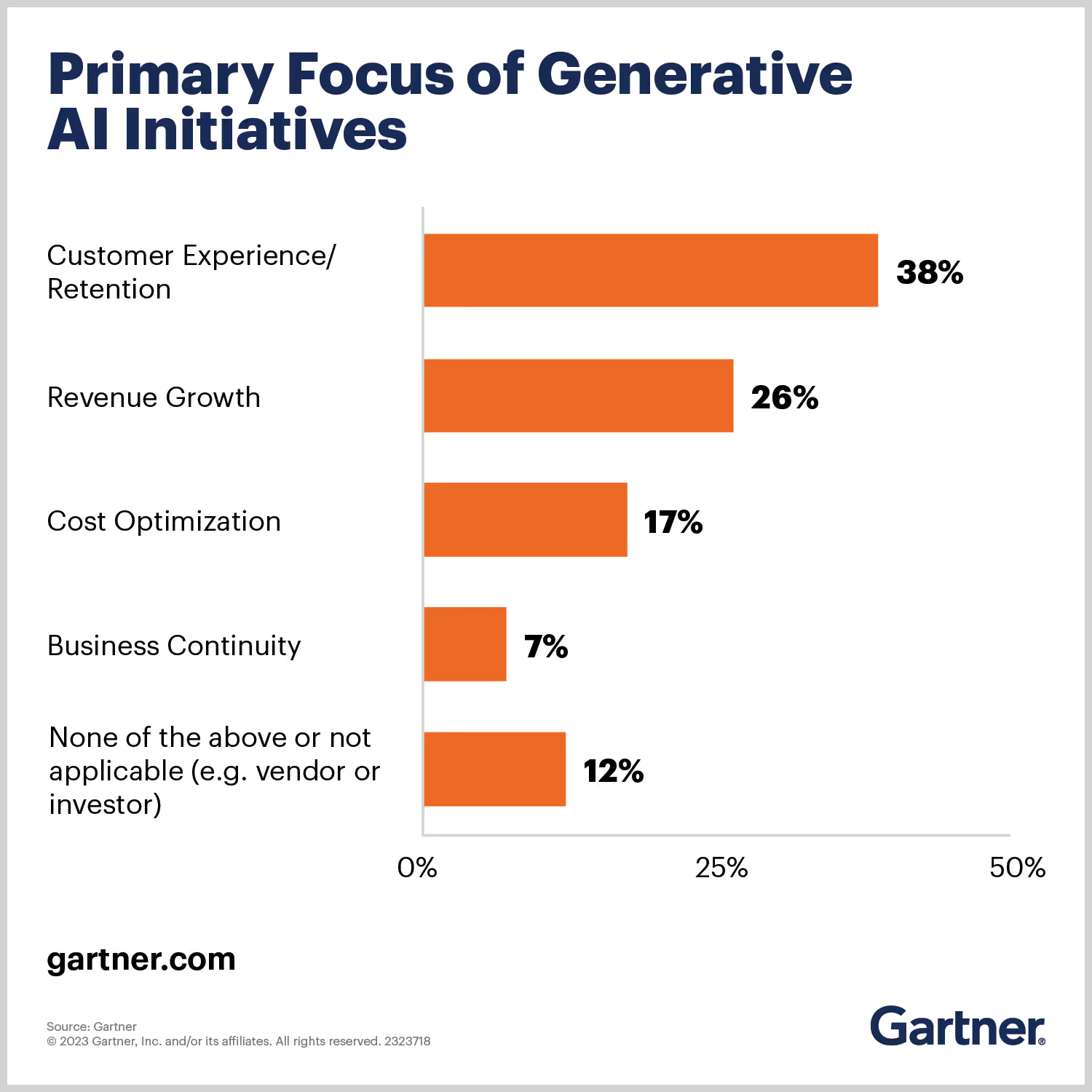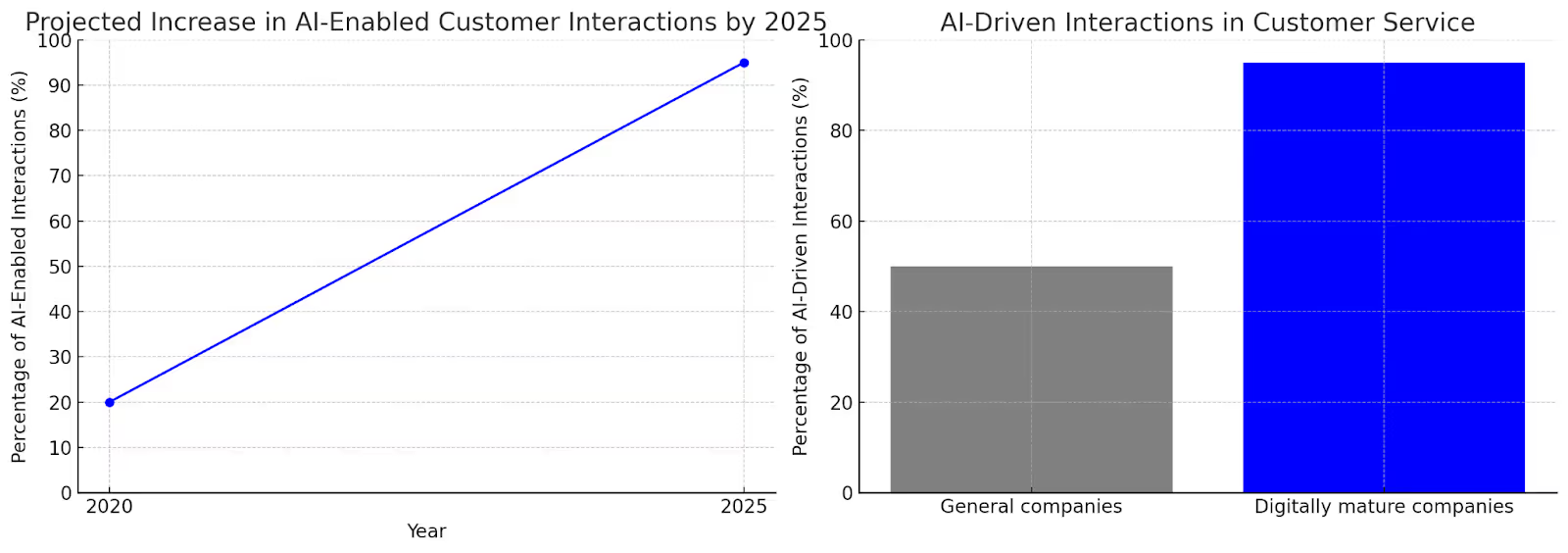Key takeaways
- AI call centers cut average handle time to under 20 seconds using Synthflow’s 700ms low-latency decisioning.
- Gartner projects $80B in contact center savings by 2026 through conversational AI cost reductions.
- Enterprises using AI call centers report 85% lower operating costs and 300% ROI within 12 months.
- 40% of contact centers lack omnichannel visibility, while AI agents with CRM/UCaaS integrations close this gap.
- Companies adopting AI call routing achieve a 60% drop in wait times and 25% higher customer satisfaction.
Unlike conventional call centers that rely primarily on human agents to manually manage every interaction, AI-powered call centers use intelligent systems to handle basic inquiries, route complex issues to appropriate agents, and continuously improve operational efficiency through data-driven insights
This approach solves one of the biggest frustrations in customer service: outdated IVR systems that nearly all callers try to skip. Instead of navigating long menus, customers engage in human-like, contextual conversations that feel natural and intuitive. Businesses reduce costs, shorten wait times, and improve customer satisfaction.
The impact is clear. The global Voice AI Agents market is projected to grow from 2.4 billion dollars in 2024 to 47.5 billion dollars by 2034, representing a compound annual growth rate of 34.8 percent. Companies adopting AI voice agents report up to 85 percent cost reductions and ROI improvements of 300 percent or more within the first year.
AI call centers are no longer optional. They are becoming the new standard for organizations that want to scale support, increase efficiency, and meet rising customer expectations through contact center automation. In the following sections, we will explore the key capabilities that make AI voice agents the foundation of next-generation call centers.
AI Voice Agents: The Next-Generation Call Center Solution
Gone are the days when a call center meant a group of operators simply answering phones and routing calls. Today’s contact centers run full-fledged relationships that serve customers over chat, voice, and social. However, a significant portion (40%) of contact centers are still unable to transition customers between channels because of little or no visibility of prior interactions. Modern AI voice agents achieve up to 93.3% accuracy in speech recognition, with 76.5% accuracy maintained even in noisy environments.
That’s where AI voice agents come in handy. AI voice bots and agents can now work together to provide a personalized customer experience during handoffs. By leveraging integration with various tools such as CRM systems, communication channels (like Slack, email, or messaging apps), and task management software allowing the next agent or human to pick up where the previous left off without losing momentum. Some solutions, including Synthflow, also use mid-call APIs that analyze conversations in real time and decide whether to resolve the issue directly or transfer it to the right live agent, which reduces unnecessary handoffs and shortens resolution times. No matter what channel you choose to interact with the business, AI agents will provide every piece of information they know to make it easier for customer support agents to provide quick, personalized support.
Brands are leveraging AI-powered assistants for both customers and agents; enabling customers to self-serve while equipping agents with information, context, and suggested responses to enhance support efficiency. Enterprise-grade AI voice agents deliver measurable results, with some organizations achieving up to 30% reduction in operational costs and sixfold increases in efficiency.

Business leaders feel confident about using AI to engage with customers, with 88% saying if their customers could communicate with an automated system to get issues resolved quickly. Gartner forecasts that conversational AI platforms will reduce contact center costs by $80 billion by 2026. Virtual agents not only cut hold times and reduce human error but also handle large call volumes simultaneously, sometimes delivering the output of dozens of agents at once.
When implementing conversational AI programs, organizations need to keep in mind consumers are looking for functional and responsible AI experiences. They are not looking for AI to replace what humans are best at–building connections. For now, consumers simply want AI that’s convenient, fast, and easy to use. This is why most companies adopt a hybrid model, letting AI handle repetitive or high-volume queries while human agents focus on sensitive or complex cases where empathy and problem solving matter most. In 2025, Gartner predicts organizations will replace 20% to 30% of their service agents with generative AI by 2026, while simultaneously creating new jobs to support the technology.
The brands that take time to understand consumer expectations around AI will be the ones that see their investment in AI pay off.
Key capabilities of AI voice agents
Most businesses do not have the AI or customer engagement expertise to build full AI call centers in-house. That’s why it's crucial to choose an AI partner that understands your customer’s needs. For example, Medbelle, a healthcare provider, used Synthflow’s AI assistant to reduce patient wait times. Scheduling efficiency increased by 60 percent and appointments more than doubled, showing how the right partner can deliver measurable results.
Natural language understanding (NLU)
An AI voice agent understands user queries by converting speech into tests using AI and NLP. It then forms an appropriate response and converts it back into speech using text-to-speech (TTS) technology. Modern conversational AI leverages advanced transformer models like GPT-4 and multimodal capabilities, enabling systems to process not only text but also images, audio, and code in real-time.
AI agents excel in:
- Understanding situational nuances
- Recognizing relevant background information
- Interpreting user intent beyond literal instructions
- Applying domain-specific knowledge appropriately
Personalization capabilities
Consumers don’t just want personalisation, they demand it. Furthemore, Mickensey confirms that companies that excel at personalisation generate 40 percent more revenue than companies that don’t. In 2025, AI agents utilize contextual understanding including past purchases, location, tone, and previous queries to deliver incredibly personalized support experiences. Non-personalised interactions also pose business risk to loyalty.

Customers want quick and personalized responses to their queries, unlike complex IVR systems with lengthy menus and frustrating options. An AI voice agent offers contextual, human-like conversations, adapting to the user's intent. It skips irrelevant conversations, detects speech cues, and also offers calls to the right voice agents. Modern AI systems can analyze past calls and use predictive analytics to anticipate customer needs, creating proactive and personalized conversations that improve customer satisfaction by 67%.
They can also analyze past calls and use predictive analytics to anticipate needs, creating more proactive and personalized conversations.
Multi-language support
AI voice agents break down language barriers by supporting multiple languages to provide a more inclusive and accessible customer experience. The multilingual voice agents segment is expected to grow at the fastest rate through 2030, driven by increasing need for linguistic inclusivity and culturally competent interactions.
Synthflow AI offers ElevenLabs integrations to enhance its AI voice capabilities. You can choose from hundreds of different voices or clone your voice. Syhthflow guardrail top LLMs like Llama and OpenAI's GPT-3 through GPT-4o. It also offers multilingual and accents—from Australian and British to Argentinian Spanish to support effective communication. This makes it a versatile tool for global businesses.
That means low latency, so conversations feel natural, and responses are quick with no awkward pauses. As multilingual support scales, it helps companies meet rising expectations without hiring large multilingual teams, a challenge many organizations struggle with. The Voice AI market supporting multilingual capabilities is projected to reach $44.7 billion by 2034, reflecting the critical importance of accurate cross-cultural voice processing.
Decision-making capabilities
The decision-making capabilities of AI agents make it an ideal alternative to human agents for simple tasks. The sophistication of this decision-making process lies in its ability to consider multiple factors simultaneously, weighing options much like a human expert would. Advanced AI systems now demonstrate sophisticated reasoning capabilities and can apply domain-specific knowledge appropriately, making them increasingly effective for complex decision-making scenarios.
These systems can:
- Evaluate multiple possible courses of action
- Analyze complex situations in real-time
- Adjust decisions based on new information
- Balance competing priorities and constraints
In practice, this means they can reduce the traditional six-minute average handle time by automating simple queries and routing more complex ones to the right human. They also help call centers meet the “80/20” service target of answering 80 percent of calls in under 20 seconds, which most human-only teams fail to achieve. Synthflow’s latency of 700ms makes this possible at scale.
Third-party integrations
The average organization has approximately 275 SaaS applications. What’s more, is that the average organization adds approximately 7 new applications every month. Companies now demand omnichannel integration that unifies all communication channels, creating seamless customer experiences and eliminating the 40% visibility gap that currently exists between customer interaction channels. Integrations enable these apps to work as a well-oiled machine. A voice agent with API-based or plug-and-play integrations can adapt to new software without major reconfiguration.
Synthflow AI offers integration capability to some of the most powerful integration capabilities, including:
- Hubspot: Seamless content management and HubSpot workflows to boost your business productivity and automation.
- HighLevel: Qualify leads, book appointments, and significantly scale your outreach.
- Zapier: Connects with 6000+ apps to automate and streamline your tasks.
- ClickFunnels: Create, manage, and scale your marketing strategy.
- Cal.com: Book appointments directly into live calendars while sending instant notifications.
- Make.com: Design, build, and automate anything.
- RingCentral: Unified communications that keep your team connected across voice, video, and messaging.
- Five9: Intelligent cloud contact center built to boost agent productivity and customer satisfaction.
- NICE: AI-powered customer experience solutions designed for smart, seamless interactions at scale.
- Genesys:Orchestrate personalized customer journeys across channels with powerful CX automation.
- Talkdesk: Cloud-native contact center with speed, flexibility, and AI to future-proof your service.
- Zendesk: Effortless customer support software that turns conversations into lasting relationships.
- Twilio: Developer-first platform for building custom communications across voice, SMS, and more.
Modern integration platforms enable businesses to consolidate cloud environments and automated technologies, creating unified ecosystems that allow AI agents to draw information from UCaaS, CCaaS platforms, workforce management systems, and CRM platforms for enhanced customer journey mapping.
The AI-Powered Call Center Ecosystem
AI is now embedded in nearly every facet of running a modern call center — from workforce management to real-time analytics and customer interactions. In this overview, we’ll explore how AI is transforming the call center landscape, the key areas it impacts, and what this means for efficiency, scalability, and customer experience. More than 99% of professionals say automated solutions are valuable, with IBM research showing that companies leveraging AI and chatbots can reduce operational costs by up to 30%.
AI-powered IVR & call routing
Harvard Business Review quotes the major challenges customers face when contacting a customer service organization, are:
- 56% have to re-explain an issue
- 57% have to switch from web self-service to a phone interaction
- 59% say resolving their issue requires moderate to high energy expenditure
- 59% are transferred to another specialist
- 62% have to contact the provider repeatedly to resolve the issue
One of the ways this issue can be solved is through efficient call routing. And with AI, it’s done even better. AI call routing uses artificial intelligence to direct phone calls to the right person or department quickly and efficiently. Businesses using this have reported a 60% drop in wait times and a 25% increase in customer satisfaction.
If no human agents are available when customers call, they are routed to a call queue or voicemail boxes. Customers may also be prompted to schedule an automated callback, a popular alternative to waiting on hold. Unlike traditional IVR systems, which are confusing and lengthy, leading to decision fatigue and call abandonment, AI call routing eliminates manual call transfers and holds, reduces caller waiting time, and increases first-call resolution rates. Unlike traditional IVRs, AI IVR meets service speed targets consistently by eliminating manual transfers and reducing abandonments.
Advanced AI routing systems now provide intelligent lead qualification through automated discovery dialogues, routing high-potential prospects to sales teams and enabling dynamic pricing and personalized offers mid-call.
AI-driven call screening
According to Hiya, the majority of companies have experienced 2-10 inbound attacks every year.

Last year, MGM Resorts, a prominent casino chain, lost $100 million in revenue and experienced operational losses due to an inbound call attack. The hackers reportedly found an employee's information on LinkedIn, then impersonated them in a call to MGM Resorts' IT help desk to obtain credentials that they used to access and infect IT systems.
AI-powered call screening helps businesses take control of their phone lines–filtering and identifying incoming calls, choosing how to respond to those specific calls, and blocking annoying spam. Through this information, the caller can decide whether to answer it or send it to voicemail.
With the right call screening partner, you don't have to deal with robocalls and spam calls. By using a list of known spammers (both individuals and organizations), it's possible to filter out spam calls coming to your business. And, if any call manages to scale, the call screen partner asks to manually screen the call for relevant information before passing it to the human agent.
Predictive analytics and customer insights
We live in an era of connection and call centers are no exception. Businesses are expected to not just meet the needs of customers but anticipate and exceed them. According to a 2023 Salesforce State of the Connected Customer report, 88% of customers say the experience a company provides is as important as its products or services, and 62% expect companies to adapt based on their actions and behavior.
Hyper-personalization is the most advanced way brands can tailor their communication to individual customers. It’s done by creating custom and targeted customer experiences through the use of data, analytics, AI, and automation. Through hyper-personalization, companies can send highly contextualized communications to specific customers at the right place and time and through the right channel. Using a robust AI call center insight platform, call centers can monitor and analyze customer interactions across various channels, including calls, chats, and emails.
Call centers can leverage predictive analytics to forecast customer needs and behaviors. This proactive approach allows for personalized service and can help agents anticipate and address potential issues before they escalate. This turns each call into a source of intelligence, allowing managers to spot trends, prevent churn, and proactively solve problems. Continuous monitoring, security compliance with GDPR/CCPA, and balanced human-AI collaboration are essential for sustainable adoption.
Advance AI-Voice Innovations for call centers
Voice AI is quickly becoming the most transformative technology of 2025 that goes beyond basic IVR instructions to providing highly personalized context-aware experiences. Real-time language translation, seamless device integration, and emotion identification are among the driving forces in industries such as retail, healthcare, and call centers.
Picture a future where your digital interactions are so personalized and seamless that it's almost like chatting with your closest friends. With each passing day, we’re approaching this reality. Let's explore the exciting developments on the horizon for AI voice technology.
Multilingual AI agents
Native language customer service is core to the customer experience (CX). But, why are businesses not adopting multilingual customer support? Because:
- The European Commission discovered that over 1/3rd of EU companies find it challenging to fill multilingual customer support roles due to a lack of language skills.
- Research from Harvard Business Review indicates that turnover rates in multilingual customer support departments can reach as high as 45 percent—twice the average rate.
- Expanding on this, the 2022 NICE WEM Global Survey found that departments with over 5,000 multilingual support agents experience an even higher turnover rate of 50 percent.
This shows that businesses are not only struggling to hire multilingual agents but are also unable to retain them for long. But, these challenges get eliminated by adopting multilingual AI agents. Multilingual conversational AI uses artificial intelligence to engage in conversations across languages, enabling call centers to serve customers in their preferred languages. So instead of maintaining large teams of multilingual support staff, companies can deploy these AI agents to handle customer interaction across various languages.
With their ability to provide personalized assistance, multilingual agents can significantly reduce wait times and frequent transfers. Research shows a growing openness to this technology, particularly among Gen Z consumers who are willing to embrace innovative solutions for a more seamless and efficient customer service experience.
Generative AI for real-time communication
Gen AI is a type of artificial intelligence that can generate high-quality text, images, audio, and other content depending on the data they’re trained on.
These models identify and encode the patterns and relationships even in huge amounts of data, and then use that information to understand the user's natural language requests and respond with relevant new content. The rise of generative AI seems to have spiked interest in the broader set of AI capabilities. A survey from McKinsey revealed that AI adoption in respondents' organizations remained around 50% for six years before surging to 72% in 2024.

Generative AI helps contact centers with interaction summarization, customer sentiment analysis, real-time language translation, personalized product recommendations and chatbots. The technology understands customer intent by first analyzing customer queries and sieving through various knowledge resources looking for the answer.As it processes these inquiries, GenAI generates a relevant customer response that the agent can review, refine, and send to the customer.
This final step is essential, ensuring human oversight to minimize the risk of inaccuracies and safeguard service teams from GenAI hallucinations.
AI voice agents
As your business scales, you can get hundreds or even thousands of leads every day. Lead qualification can sometimes feel like playing the lottery–you get a whole bunch of tickets but many winners.
But don’t worry–AI agents are here to save the day. They can significantly increase your close rates—potentially by 20, 30, or even 40%. By 2025, Accenture predicts that 95% of customer interactions will be AI-enabled. McKinsey reports that automation can cut service costs by up to 30% while maintaining quality, even during a high volume of calls.

Here’s how it works: AI voice agents jump into action the second a lead comes in. These digital dynamos can ask qualifying questions like “ What’s your budget?” or “Are you interested in our product?”. By the end of the call, the AI agent will score the lead, so you know whether you have gotten a hot lead ready to convert or someone’s just browsing.
If needed, the AI can even schedule future calls or follow-ups, keeping the conversation going.
The easiest way to get started is by using an AI-powered voice tool like Synthflow that will help you scale and automate lead qualification.
Voice bots respond in seconds, process thousands of requests per minute, pre-qualified leads, and seamlessly update your CRM. Synthflow AI can make a large volume of calls to qualify leads based on your sales team's predefined criteria. 0
Overcoming Common Challenges with AI Call Centers
Call centers are vital for customer service, connecting businesses with customers. However, with AI technology advancing rapidly, a crucial question arises, Will AI replace call center agents by 2025? AI Replacing Jobs? AI Lacks Emotional Intelligence? AI Can’t Handle Complex Queries?
Let’s explore how AI is shaping the future of call center operations by answering these crucial questions.
AI Replacing Jobs
AI will undoubtedly transform all call centers by automating routine tasks and improving efficiency, but replacing humans agents & recpetionist is neither practical nor advisable. Chatbots and virtual agents excel at managing repetitive tasks such as tracking deliveries, checking account balances, resetting passwords etc. Automating these processes significantly reduces wait times, enabling humans to focus on high-value, complex interactions.
AI Lacks Emotional Intelligence
AI, as it stands today, operates on algorithms and data patterns. However, recent developments in natural language processing and sentiment analysis have allowed AI to mimic empathetic communication to some extent. For instance, AI chatbots can be programmed with empathetic phrases and responses to create more human-like conversations. By identifying specific emotional cues, AI can deliver personalized responses that validate and address customers’ emotions.
AI has Data Privacy Concerns
As technology evolves, data privacy regulations are essential in protecting sensitive information. These regulations ensure businesses act responsibly with personal data, promoting trust between companies and consumers. Key regulations that govern data privacy include GDPR, CCPA, HIPAA. Businesses must ensure that AI systems respect privacy and are developed without causing harm or discrimination.
AI-powered call centers balance automation with human expertise, ensuring scalability and compliance.
The Future of AI-Powered Call Centers
Today, customer care organizations lack many of the critical skills they need to deliver excellent service. Since the level of staff turnover post-pandemic is high, supervisors spend a significant amount of their time interviewing and bringing new staff to speed.
This is where the Synthflow AI platform steps in, offering a comprehensive solution to elevate the pain points of e-commerce businesses. Synthflow's no-code, drag-and-drop interface allows users to set up a voice agent in minutes without needing any technical knowledge or coding ability. It can seamlessly handle a large volume of calls across all timelines and languages.
With Synthflow AI platform, you can:
- Create and launch your generative solution in minutes.
- Offer automated customer service across chosen platforms, including voice and chatbots, ensuring a seamless omnichannel experience.
- Deliver tailored responses based on a comprehensive understanding of customer profiles, reducing resolution and response times through smart replies and pre-set responses.
- Analyse customer conversation across more than 20 channels, optimizing future responses and enhancing customer engagement through conversation analytics.
Want to try a free demo to see how you can replace your traditional call centers with AI voice bots? Sign up ere.


.avif)



